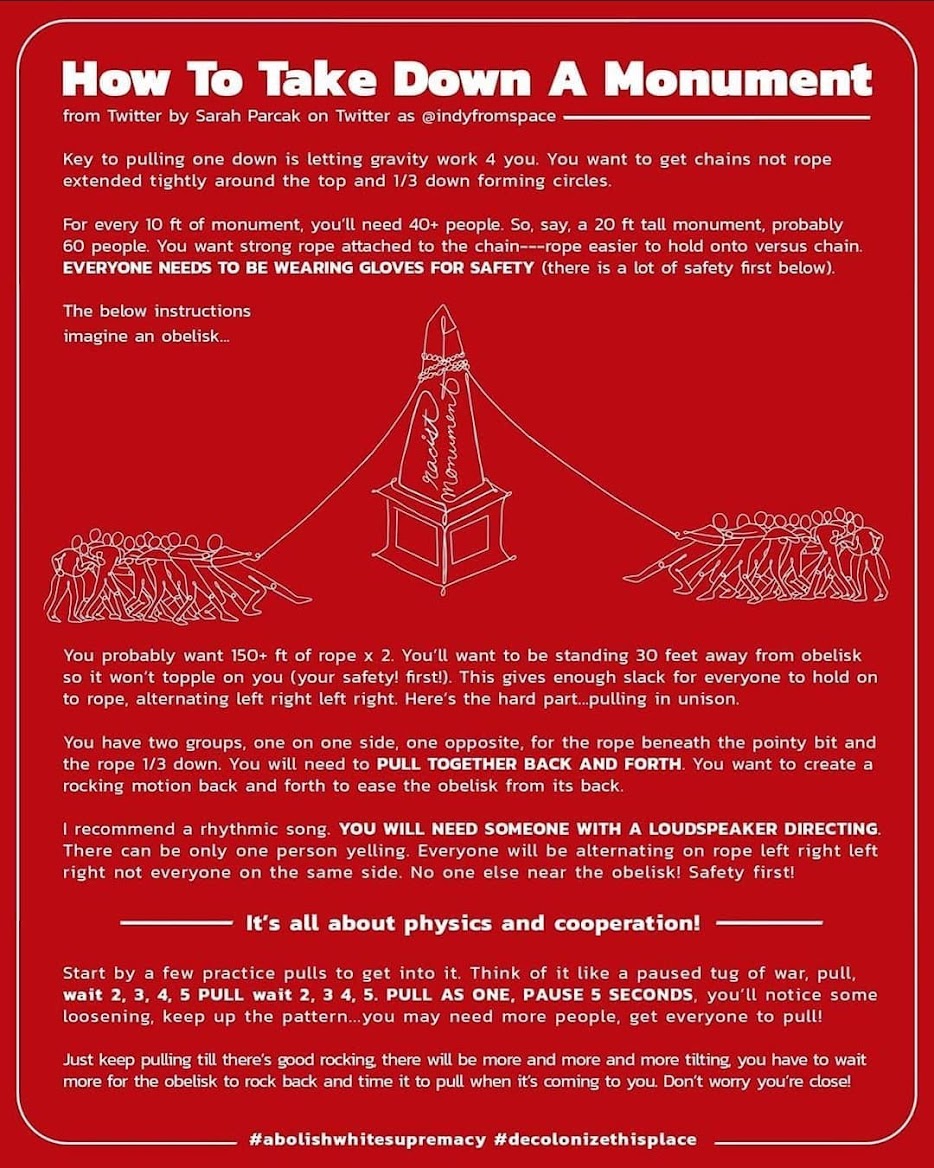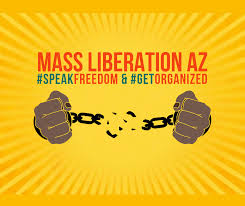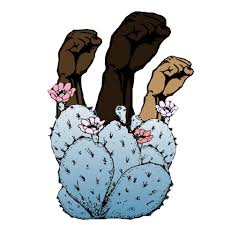By the way, this was one of their kickoffs for the "mugshot-of-the-week" contest.
Lots of people thought he was funny.
I know this guy, personally - and it wasn't funny.
Cancer is what ate his face.
---------------from TRUTHOUT-----------
Against Mugshots: Photos of the State's Latest Catch Don't Belong in a Free Press
Wednesday, 04 February 2015 10:20
By Charles Davis, Truthout | News Analysis
An image can tell a story, but like any tale it could very well be full of lies. Who is taking a photo - when they have taken it and why, what they have decided to include and chosen to leave out - invariably affects what we, the viewer, see. The lighting, positioning and camera angle can sway whether the picture evokes empathy or anger, lust or revulsion. The photograph is an unreliable narrator, then, telling us part of a story but giving us nothing close to the full picture.
A mugshot, the picture taken after an arrest, is a photo designed to tell the state's side of a story. The subject of the photo, taken at one of the lowest points in their life, has no voice, but the language of the form - the unflattering bright light, the drab background, the name and prisoner ID at the bottom - tells us we are looking at a "criminal."
With the internet, that "we" has expanded to the far reaches of the globe. Today, police in the United States can upload a photo of their latest catch to Facebook and see it in a foreign tabloid by the end of the day. Before the subject can mount a defense, a 1,000-word photo pronouncing their guilt may have already gone viral. Stacking the deck in favor of the already advantaged police, the photos discourage empathy in favor of judgment: of the accused person's appearance and their overall worth as a human being. Depicted only as a transgressor, not as a mother or father or someone's son or daughter, the subjects of mugshots become fair game for abuse. We can mock their looks and class and perceived intelligence without feeling guilty; this humiliation becomes just another manifestation of punishment (often before a conviction has even taken place).
The press partakes readily in this ritual debasement, the most respectable of media outlets eagerly distributing the state's unflattering photos, of people who have yet to be convicted of anything, on the front page and on the evening news and on dedicated websites that feature nothing but mugshots, sortable according to the physical features of the once-human body that is now behind bars, with a line at the end or in small print thrown in, almost as an afterthought, that the person we see is "innocent until proven guilty," though the implication of guilt hangs heavy over every photo: Come on, just look at them.
Almost everyone looks like a criminal because every arrested person we know who has been caught has posed for the same photo. And it's the looks of the person, not necessarily the severity of their alleged crime, which often makes a mugshot go around the globe.
"Woman arrested for meth possession while wearing 'I Love Crystal Meth' shirt," reported the Associated Press wire service, ensuring this important news would make it into papers across the country. "This Might Be The Most Ironic Mugshot Ever," said BuzzFeed. "Not ideal mugshot attire," snarked the Daily Mail, all the way over in Britain. "Walter White was a genius," said the New York Post, referring to a character from a TV show who was given the benefit of a backstory. "This woman? Not so much."
Unlike cable's most artfully depicted anti-hero, all we know about "this woman," whose arrest made international headlines, is what has been said about her by police. We don't know what led up to that moment (Did any of the reporters covering her arrest do any reporting?) except that, according to the sheriff's department in Laurel County, Kentucky, she and another person allegedly possessed "3.37 grams of crystal meth and a set of digital scales." We also know that under state law an intent to sell more than two grams of methamphetamines (street value: about $200) makes one a "trafficker," a fact that wasn't to be found in any of the 20,000 news stories that were published about Deborah Asher, actual human being, within a week of that arrest. While the worldwide web-browsing community snickered before moving on to the next content, its object of contempt sat in a jail cell grappling with the possibility of spending the next 10 to 20 years behind bars.
Asher was reduced to that booking photo, originally posted on Facebook by those who arrested her, and one sentence reducing her life experience to "criminal." She was marked "bad," so gestures of superiority and even celebration of her misfortune - disparaging the intelligence, looks and class status of a stranger - were given a thin veneer of moral justification.
"We're very judgmental people - that's a human trait," noted Mariame Kaba, founding director of Project NIA, a Chicago-based organization that promotes alternatives to incarceration, when I spoke to her on the phone. "You have to work at being nonjudgmental," she said, but mugshots discourage that, inviting us instead to sit back in judgment and indulge that vulgar human desire to feel better at the expense of some other poor wretch. "The circulation of these kind of images allows people to play out that judgment," Kaba added, "to be able to look at somebody else and see someone who is worse off."
Some argue that the dissemination of mugshots is necessary, so we can identify "criminals" should they escape state custody.
"Knowing the names and faces of those formally charged with crimes helps us protect ourselves and allows us to make informed decisions on who we want to associate with," Greg Rickabaugh, owner of the mugshot gallery and crime reporting website AugustaCrime.com, told television station WJBF. He was reacting to a new law in Georgia, passed by a legislature not known for its bleeding-heart liberalism, which bars local police departments from posting booking photos online. Mugshots are still public records and as such are available upon request, but websites that obtain the photos are required to remove them, without a fee, if charges against the person in them have been dismissed.
The law is aimed at thwarting the dozens of websites that take these photos from the state-sanctioned system and repost them in the hopes of getting the person in them to pay hundreds of dollars to have them taken down, what Rickabaugh calls the "predatory" mugshot websites, contrasting them with the ostensibly legitimate exploitation exercised by websites like his, which earn profit through the classier, indirect route of advertising. Indeed, Mark Caramanica of the Reporters Committee for Freedom argues that, on principle, both not only have a right to exist, but have a right to easy, automated access to the photos of those whose rights have been taken away.
"Should we shut down the entire [mugshot] database because there are presumably bad actors out there?" Caramanica told The New York Times (who the "bad actors" actually are is left open to the reader's interpretation). "I think it's better if journalists and the public, not the government, are the arbiters of what the public gets to see."
Portraying the debate over the routine posting of mugshots online as one between those old (ostensible) foes, the free press and the state, is a smart public relations strategy. It is also absurd: It is the state, after all, that takes and then provides these photos to the press - photos the person whose liberty the state has taken away would generally prefer not be plastered across the media for friends and family to see. Like the other profit-driven sites that post these photos, the corporate media is effectively providing free press for the police, who get to show their side of the story ("proof" of criminality) - often before the person photographed has even had a chance to place their one phone call.
Yet in examining the issue of mugshots - or, really, any matter of the ethics of privacy - should we really stick to the narrow question of whether one has a "right" to do something? Legal rights aside, is it the right thing to do?
"Right 2 Know" is the slightly too defensive name the Chattanooga Times Free Press has given to its own mugshot gallery. Just looking at those featured on its homepage when I last visited, the alleged criminals the public has an interest in seeing shamed include a young man accused of underage drinking, a woman accused of driving on a revoked license and a woman accused of driving under the influence. The information is "presented here as a public service," the paper assures, the photos "gathered from open county sheriff's web sites," showing the state to be a publishing partner (certainly calling into question the position of the "fourth estate"). In fine print, we're told that "people shown on this page have not been convicted of these crimes and should be presumed innocent until proven guilty." If they are found innocent and possess the right paperwork, the site will even take down the legally declared person's photo, though by that point the photo will have already been out there on the internet, where it might very well serve defamatory purposes long into the future.
"I believe that there is a way to strike a balance between public interest in information while really respecting folks' rights as individuals who have not yet been convicted of anything," said Zachary Norris, executive director of the Ella Baker Center for Human Rights, which seeks to reduce the threat of incarceration facing communities of color. "And I don't think we're striking the right balance at all with the publication of these mugshots because, effectively, in that context the only information you're getting about someone is that they did something wrong."
The use of that information becomes an ethical question with which the journalism community must wrestle. "Recognize that legal access to information differs from an ethical justification to publish or broadcast," says the Society for Professional Journalists in its code of ethics. "Avoid pandering to lurid curiosity, even if others do."
However, this code is likely read almost exclusively by journalists working on stories about ethics in journalism - and when it comes to publishing the photos of the recently arrested, few seem to have given the issue much thought. Erin Madigan, a spokesperson for the AP, said decisions at the newswire "are made on a case-by-case basis," but neither BuzzFeed nor The Washington Post responded when I asked if they had policies in place governing the use of such photos.
"We're all human and we all make mistakes," Norris told me. But the availability of these photos works against our ability to identify with the humanity of those who've been arrested. "In addition to that, these mugshots can have real ramifications in terms of people's ability to get jobs, [and] real ramifications in terms of their public reputation," he said. Be one a naked profiteer or a publication ostensibly pursuing the public interest, publishing these photos at all only "adds to an already pernicious environment where poor people are disadvantaged by the justice system."
But what of the pretty ones? Though the consumption of mugshots tends to focus on the wacky and conventionally unattractive, lately there has been a noticeable uptick in attention paid to what social media has dubbed the "#FelonBae." Jeremy Meeks took Twitter by storm over the summer of 2014 with his dreamy blue eyes, which were posted on the Facebook page of local police in Stockton, California. "Hot mugshot guy," The Washington Post called him in a report on his first courtroom appearance, which noted, almost as an aside, that it wasn't all fun and games for the hottie: He learned that he could spend up to 10 years in prison on a gun charge. "But," the Post pointed out, "There are photos!"
"Felon bae" is a certifiable trend. "Meet Your New 'Hot Mugshot Guy,'" reported The Daily Beast a few weeks later when another man in California was arrested, allegedly for assaulting a Fox News cameraman.
"These good-looking criminals that circulate on social media that people trade, like cards - it becomes that, just another player card," Mariame Kaba told Truthout. "It's not actually a human being, at all, and it doesn't matter that these folks have been accused of a crime that hasn't been proven." They are, ultimately, more meat to be objectified, "with a complete and utter disregard for people's humanity."
The Tampa Bay Times even categorizes the bodies in police detention according to height, weight, age and eye color, allowing the alleged felon fetishist more options for sorting their potential "baes" than what's available on most dating sites.
However, there are select cases in which the state fights to prevent mugshots from ever seeing the light of day. When the Detroit Free Press sought to publish the booking photos of four cops convicted of accepting bribes and conspiring to deal cocaine, the US Marshals Service refused to release to them. That prompted a lawsuit and, in April 2014, a federal judge sided with the paper and its attorney, Herschel Fink, who argued, according to the Associated Press, that the public "has a legitimate interest in seeing who has been arrested and charged with a crime."
But what exactly is that interest, and does it matter who the arrestee is, or what the context of their alleged crime may be? As US Department of Justice attorney Galen Thorp argued - entirely out of the state's self-interest in this particular case - that just publishing a mugshot could inflict serious damage on a person. "An 18-year-old arrested for a federal misdemeanor who appeared in court, pled guilty, did community service, and had his or her record expunged, could find his or her booking photograph immortalized on the Internet for every would-be employer to see for many years to come," Thorp said.
Of course, if a mere photo of an arrest for a minor crime can do such damage to a person, it raises the question: Why book any teen, or anyone, over a nonviolent misdemeanor when that arrest could prove much more damaging to society in the long run - once brought into the legal system, one's chances of coming back are exponentially greater - than the alleged offense? And, the cynicism of the state's arguments aside, those who would further the ruining of someone's life should ask themselves: to what end?
Indeed, what is the point, even, of posting a bad cop's mugshot? Arguably, it could show that no one is above the law - but of course, that principle is patently untrue: A black teen who kills a dog gets 23 years in prison while a white cop who kills a black teen, as a rule, gets maybe a paid vacation.
"I'm against posting people's mugshots just categorically," Kaba told Truthout. "If I don't believe the mugshots of people without power have meaning or purchase, then I don't think mugshots of people in power have meaning or purchase," she said. Desiring vengeance - to see one's enemies humiliated - may be understandable, but it's not a healthy basis for a system of justice or a desire to which we ought to cater. "It's the same kind of performance and spectacle that I think doesn't actually lead to what we want," said Kaba, "which is a redress of whatever it is that happened or, in some expansive way, justice."
This is not to say that publicizing who has done harm in a community is without merit. The power of social sanction, of shunning those who have violated community norms, is in many ways a more powerful and effective mode of accountability than just locking someone up for an arbitrary period of time where, instead of learning healthier behaviors, anti-social behavior is only reinforced.
"Particularly in the early 1960s to the mid to late-1970s, many feminists used to post posters around their community of rapists to alert other people and let them know what was happening, on the one hand, and to basically out and shame that person who has harmed people," Kaba said. "And I can understand that. I can see the value in having that as a warning to other people."
But the photos being posted today are overwhelmingly not those of people who are actively causing harm, but of people whose alleged offenses don't deserve to even be lumped under the same heading of "crime": nonviolent drug offenders, for instance, and disproportionately the poor and people of color. Posting their photos without any context but that provided by the state doesn't make us safer, but serves only to reinforce racist assumptions of criminality.
How do we move forward, past a practice of constant visual criminalization? Many advocates argue that public records should remain public, upon request, but barring local law enforcement from dumping these photos online is a demand that chills no one's right to free speech.
We also must actively hold those who fetishize mugshots accountable. "I think that we should be calling out these entities that are making a spectacle of folks and making profit of them in ways that don't jive with our idea of justice and common decency," Norris said. There's no reason why "ethics in journalism" should be the sole domain of video-game addicts who wish only to drive feminists away from their toys. So long as they purport to have them, editors should at least be forced to think about the ethics of what they are doing when they expose powerless people to the online judgment and ridicule of a global readership. And when journalists are forced to reflect on their role in the state-sanctioned system of shaming-by-mugshot, they may even reconsider their practices.
"I really don't think that the role of a community newspaper is to punish or embarrass anybody," said Ben Carlson, general manger of The Anderson News in Lawrenceburg, Kentucky. At least, he added, it shouldn't be: Eight years after the paper first began publishing the booking photos of those accused of driving under the influence of alcohol, Carlson announced it would do so no more. In an editorial noted by the Society of Professional Journalists, Carlson argued that the press shouldn't be in the business of adding "a level of punishment, or at least embarrassment, beyond what is imposed by a judge."
None of the mugshots The Anderson News published went viral (nor had any effect on local DUI rates), but Carlson saw the impact his small-town Kentucky paper was having on the lives not just of those arrested, but on their families too. A child whose parent is in the paper is going to hear about it at school, effectively collectivizing the shame. As one father told the SPJ, "I deserved everything I got," but his innocent teenage sons were the ones who "got rode over pretty hard" by their classmates when his mugshot hit the press.
Those with much bigger platforms from which to name and shame ought to think carefully about how they use that power, what they are actually accomplishing when they wield it and whose interests are really being served.








